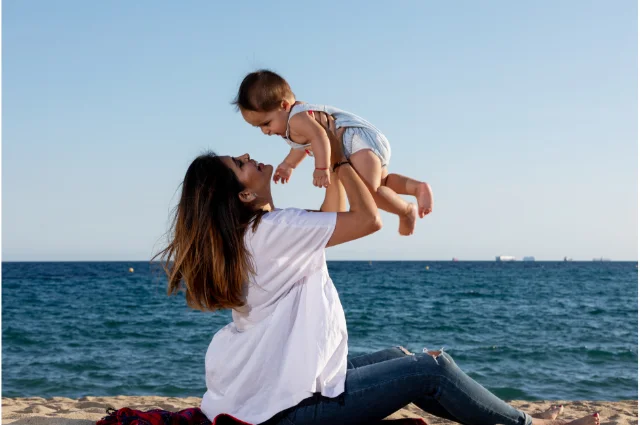It’s so much fun when your whole family spends time together at the beach. It’s an opportunity to bond with your partner and kids while relieving stress. As you plan for your next family outing, you may ask, “what age can I take my baby to the beach?” At two months old and above. The beach will not harm them if you provide your little one with the needed protection and guidance. They’re entitled to relax and feel the cool breeze. Read on to learn about tips that’ll help to keep your young baby safe, and answers to frequently asked questions like “what age can I take my baby to the beach?”
Hey! By the way… any links on this page that lead to products on Amazon are affiliate links and I earn a commission if you make a purchase. Thanks in advance – I really appreciate it! .
Is it safe to take a baby to the beach?
It’s very safe to take your baby to the beach. You must, however, take steps to protect them from anything that could harm them or cause discomfort. What age can I take my baby to the beach? You should ensure that your baby is at least two months old before taking them to the beach. To protect them from the harmful effect of the sun, you should apply sunscreen to their skin, but only when they are six months and above. Further steps to ensure their safety at the beach include preventing them from the sand and keeping them hydrated.
The benefits of taking a baby to the beach
Taking your baby along on beach outings is beneficial in several ways.
- The tranquil environment helps to calm your baby.
- Your baby becomes aware of nature, especially sea life. They learn about water and other sea creatures when they play or go close to the water.
- The beach helps to develop your baby’s thinking skills.
- Your baby’s mastery of their senses improves as they smell the air around the beach, feel the cool breeze on their skin, and listen to the sound of the ocean.
- Your baby’s creative skills develop as they participate in sandcastle-building activities.
7 Tips for taking a baby to the beach
1. Timing
It matters what time of the day you take your baby to the beach. Mornings and evenings are the coolest parts of the day and are also most suitable for beach visits with your baby. You must avoid exposing your baby to the sun’s heat as much as possible. Hence the hours between 10 am and 4 pm are not advisable for beach visits with your baby. You can also keep your baby from the sun’s rays with a baby beach tent such as the ISILER Pop Up Beach Tent available on Amazon.
2. Beach Shelter
It’s essential to provide shelter for your baby at the beach. With a beach shelter, such as the Gorich beach tent, your baby will play and have fun without being scorched by the sun’s heat. The cover provides shade for your baby to take a quick nap if needed. You can keep your other beach essentials safe and cool under the shade provided by the beach shelter.
3. Hydration
It’s essential to keep your baby hydrated during beach visits. Ensure that your baby is adequately breastfed or bottle-fed during such visits. If your baby is already eating solid foods, you should ensure they drink water regularly, so they don’t get dehydrated. You will know your baby is not adequately hydrated when you notice that they are unusually thirsty, cry without tears flowing down their cheeks, and doesn’t pass urine as often as they should.
4. Keep Baby Busy With Toys:
You can keep your baby playfully occupied during the baby’s day at the beach. Make sure you go along with a lot of toys for your baby. The essence is to give them so much fun that they’ll love to return on other occasions. It would be best to pick toys that encourage them to learn basic things like colors, names of animals, and numbers. Ocean-themed such as the Melissa & Doug Rollables Wooden Ocean Slide Toy and the GINMIC Kids Ocean Animals Toys with Large Play Mat color-themed toys will make them very excited as well. And if you didn’t remember to take toys along or your baby doesn’t seem to like those you brought, there are outlets at the beach where you can buy or rent some.
5. Remember Beach Essentials
There are essentials you should take along when you visit the beach with your baby. They are necessary to protect your baby’s eyes, skin, and face from the harmful effect of the sun. Ultraviolet rays from the sun can harm your baby’s tender eyes, so you can wear tiny sunglasses made just for kids. A baby sunhat with a wide brim will help to protect your baby’s face and neck. You don’t want your baby writhing in discomfort, so you will do well to provide adequate protection for your baby with these essentials in addition to making them look stylish and beautiful. Here is a complete blog post on Baby beach essentials.
6. Be mindful of the baby’s temperature
Your baby may get sweaty and sticky as they play at the beach. You should find a way to calm them down to avoid them crying out of discomfort. You should go along with a fan to help regulate their temperature if they should sweat a lot. Moms commonly use portable fans such as the Mini hand held fans to keep babies cool at the beach. They can easily be clipped to the baby’s pushchairs or held in hand.
7. Take Along A Beach Blanket
A beach blanket is essential when going to the beach with your baby. It helps to keep your baby comfortable. Your baby could lie on their back or tummy or crawl around on the beach blanket. The beach blanket prevents your baby from being covered in sand. A colorful beach blanket such as the JJ Cole outdoor blanket will increase your baby’s excitement as they crawl and play on it. They come in different sizes and textures; you should get one suitable for your family size and needs at the beach.
Conclusion
If you didn’t know you could take your baby to the beach before, now you know you can. What age can I take my baby to the beach? As soon as your baby is two months or older. Your baby doesn’t bond with just you during these beach visits. They get more attached to the whole family. You must, however, take all safety measures necessary to ensure your baby’s safety at the beach.

